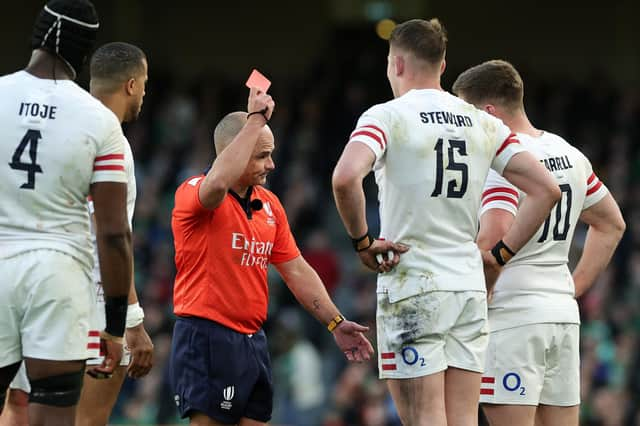Dangerous play in rugby: Finding the balance is the sport's biggest challenge


I guess some players will have to consult a dictionary to locate the sternum. Answer for those without the book: it’s the breast bone. This may take the game back to what it was when even those now middle-aged were young. It might be useful for young players also to consult old coaching manuals and study the Illustrations – photographs and drawings – demonstrating the correct ways to tackle. It’s not clear from the Press handout whether the old “smother tackle” from behind, employed to prevent a try or what we now call an off-load, will still be legal. It should be.
Meanwhile, in the professional game the big issue is the frequency with which red cards are now handed out and the effect this may have – indeed often has – on the outcome of a match. One senses anxiety about the possibility that the result of matches in the knock-out stage of the World Cup – even the final – might be influenced, even arguably determined, by the award of a red card early in the match. This is not fanciful. In the days back in 2011 when red cards were much rarer than they are now, the dismissal of Sam Warburton for a dangerous tackle on the French wing Vincent Clerc may well have cost Wales that World Cup match. Instead France, not very impressive previously, reached the final where they lost narrowly to New Zealand and, with a more sympathetic referee, might well have won that game and been World champions. All this, an aggrieved Welshman might say, because Alain Rolland, the Irish referee, had given Sam a red rather than yellow.
Advertisement
Hide AdAdvertisement
Hide AdIn this year’s Six Nations, Ireland would probably have beaten England whatever happened, but their task was made easier when the England full back Freddie Steward received a red card halfway through the match. The decision was a close call and indeed at the subsequent judicial hearing, the red card was downgraded to a yellow and Steward escaped suspension. This was doubtless some satisfaction for him, but it didn’t alter the fact that England had had to play half the match with only 14 men.
It seems likely that World Rugby may address this question before the World Cup. There is no easy answer. The red card penalty is given for dangerous play. So it would be a cop-out to downgrade it to a yellow and leave further punishment to the judging panel. One suggestion is that the guilty man should be sent off (as happens now), but replaced by a team-mate so that the balance of the match is not too disturbed. There is some sense in this, but then one wonders whether the team should not suffer to some extent, even a considerable extent, for the red-carded player’s careless violence. Perhaps it should be down to 14 for 20 minutes, twice as long as the penalty for the less serious yellow card.
It is a real problem. Dangerous play must be published and removing the guilty one from the field is both fair punishment and, importantly, a warning to others, therefore a deterrent. On the other hand the old adage of the amateur days – “the game is for the players” – no longer holds good in the professional era. Spectators pay a lot to attend a match, television companies for the right to show the game, and people at home pay subscriptions too. All complain if the match – what some doubtless call the “product” – is damaged by what may be only a moment’s indiscretion or carelessness, for after all not every dangerous tackle is malicious; it may be a matter of poor judgement, mistiming. Professional rugby is a much cleaner game that was often the case in the old amateur days – if you doubt that, read some memories of old Lions tours – the 1971 match against Canterbury would be a good place to start. But today’s players are so much bigger, heavier, more powerful and dangerous that dangerous play must be punished severely.
Getting the balance right is difficult. Some favour dismissal for a red card offence, the player then to be replaced by another but only after 15 or 20 minutes. The teams would suffer for the misdemeanour, but not to the extent that the match might be ruined. Some sort of compromise is surely desirable.